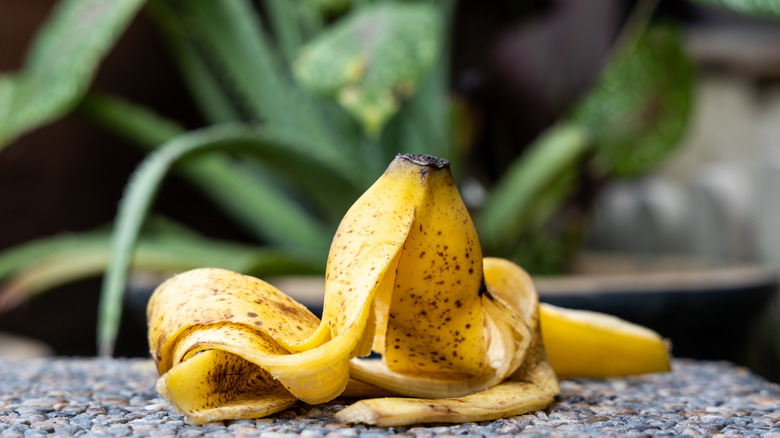We may receive a commission on purchases made from links.
Hummingbirds are known for drinking sweet homemade sugar water from feeders and nectar from flowers. While traditional hummingbird feeders and pollinator plants are a great way to attract hummingbirds to your yard, an overripe banana may be the secret to attracting more. While nectar is a vital energy source and carbohydrate, protein is essential for their health. Hummingbirds need a significant amount of protein in addition to nectar and derive about 80% of their diet from insects. Insects supply them with essential nutrients like amino acids, fat, and salt. So, how does an overripe banana tie into this? The aroma of decomposing bananas can attract fruit flies, an essential staple in the hummingbird diet.
Despite their size, hummingbirds consume a wide range of prey and are experts at aerial hunting. Their protein-rich diet consists of gnats, ants, spiders, mites, insect larvae, eggs, and mosquitoes, among others. Hummingbirds are known to grab insects directly from the air, directly from spiderwebs, and even underneath leaves. Overripe bananas may be the key to attracting some of these essential insects.
Can banana peels attract hummingbirds to your garden?

Hummingbirds eat around 2,000 insects every day to fuel their metabolic demands, and fruit is a great way to attract them. Hanging banana peels near hummingbird feeders is a natural magnet for fruit flies and other insects critical for their nutrition. As banana peels decompose, they release sugar and other organic compounds that create a perfect environment for yeast. This process creates aromatic gases that fruit flies are attracted to, drawing them into your garden.
Hummingbirds also feed on invasive species of fruit flies, suggesting their importance in helping control invasive populations. In a study by Cornell University highlighting the substantial role hummingbirds play in consuming insects, researchers found that hummingbirds feed on the invasive fruit fly – the spotted-wing drosophila –notorious for wreaking havoc and decimating berry crops. So, incorporating fruit, like bananas and banana peels, serves as a way to attract flies and, as a result, attracts hummingbirds to your garden.
Using overripe bananas to attract hummingbirds to your garden
Providing hummingbirds with overripe bananas is pretty straightforward. When deciding where to place the bananas, position them near existing feeders or areas where they frequently feed around your garden. If you’re going to provide the whole banana, make sure to smush or chop it into small pieces. You can put the banana in a small dish or tray or even use a banana-specific feeder like the Humm-Yumm. The Humm-Yumm Hanging Hummingbird Feeder is available on Amazon for around $28. This feeder combines protein and nectar into one. This hummingbird feeder holds 8 ounces of nectar in one part and has another part specifically for banana slices. It offers everything hummingbirds need: energy from nectar and protein from fruit flies attracted to the banana.
Make sure to clean your feeder at least once a week during cooler weather and every few days in the summer, and replace it with fresh nectar. Since hummingbird nectar should only contain sugar and water, following a recipe for creating DIY hummingbird nectar is your best bet if you decide to make it yourself. This prevents hummingbirds from getting sick from toxic ingredients like honey, brown sugar, and food dye. As for the bananas and banana peels, those only need to be replaced about every three weeks. Incorporating overripe bananas into your garden may be an excellent way to entice hummingbirds to visit your garden.